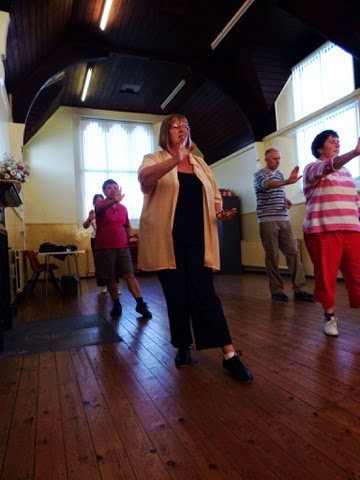"When the Student is ready, the Teacher will appear."
Tai Chi is a form of martial art and a gentle exercise that combines deep breathing and relaxation techniques with slow, flowing, graceful movements. To be fair, I don't think I have ever done anything gracefully in my life!
Tai Chi can be carried out individually or in groups. Because Tai Chi is largely based on technique, it does not require great strength or flexibility, although practice on a regular basis will aid suppleness and physical strength. It has become an increasingly popular activity for people with multiple sclerosis (MS) and is associated with stress relief and overall health improvement. As a martial art, Tai Chi involves considerable focus on spiritual aspects and on increasing self-concept and concentration. The majority of teaching in the UK only deals with the exercise side of Tai Chi. It is important to remember that Tai Chi is an internal martial art and therefore does not involve combat.
The physical and psychological effects of Tai Chi have been examined extensively in both older people and those with chronic conditions. Research has been conducted into the impact of Tai Chi had on people with chronic health problems, including multiple sclerosis (MS). Although as with most research, the research was not free from qualitative or quantitative limitations or biases, but the groups concluded that there was evidence that the exercise was of medical benefit. They found that long-term Tai Chi practice had favorable effects on the promotion of balance control, flexibility and cardiovascular fitness and reduced the risk of falls in older people. It was also found to reduce pain, stress and anxiety. Tai Chi has been shown to improve body awareness, balance and coordination and therefore to impact positively on self-confidence. It is a remarkably effective exercise proven to help mental relaxation, while strengthening both the mind and the body. Tai Chi therefore is found to impact positively on general health and general well-being.
My friend, Rose is a NAKMAS (National Association of Karate and Martial Arts Schools) Thai Chi / Chi Gung Instructor. Rose herself has Degenerative Disk Disease which is a severe and progressive back condition which impacts upon her mobility. She also experiences Chronic Pain. She understands what it is like. How debilitating. How painful. How tiring. Rose is therefore passionate about developing 'Tai Chi for Mobility' to share what she has learnt, to share the principles of Tai Chi to enrich the lives of others living with debilitating conditions and disabilities. The idea is to bring appropriate gentle exercise within the reach of people who think exercise is not for them and find traditional sports daunting. I had to give it a go.
Rose explains that the Aim is to "help people achieve a better quality of life. Tai Chi exercise provides the framework for the body to work at its best, by improving our posture, balance, co-ordination, concentration and reduce stress these things help the body to do its job more easily."
The first thing we are taught is to 'lift the head to raise the spirit'. Stand naturally straight and keep your head and neck upright, but relaxed. If your head is down then your spirit cannot be high. By straightening your back and lifting your head, the spirit will lift.
I know that some people are rather sceptical about alternative therapies. Tai Chi isn't a cure for MS, it doesn't claim to be. Rather it is a gentle exercise, a gentle exercise that aids posture and balance and it can alleviate stress; it leaves you with a feeling of calm, and when it is undertaken in good company this does indeed lift the spirits.






No comments:
Post a Comment